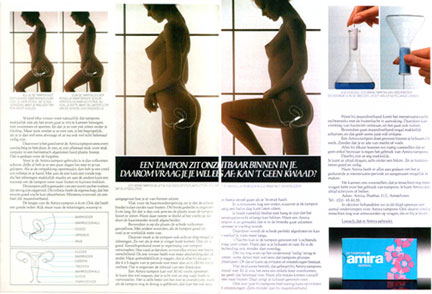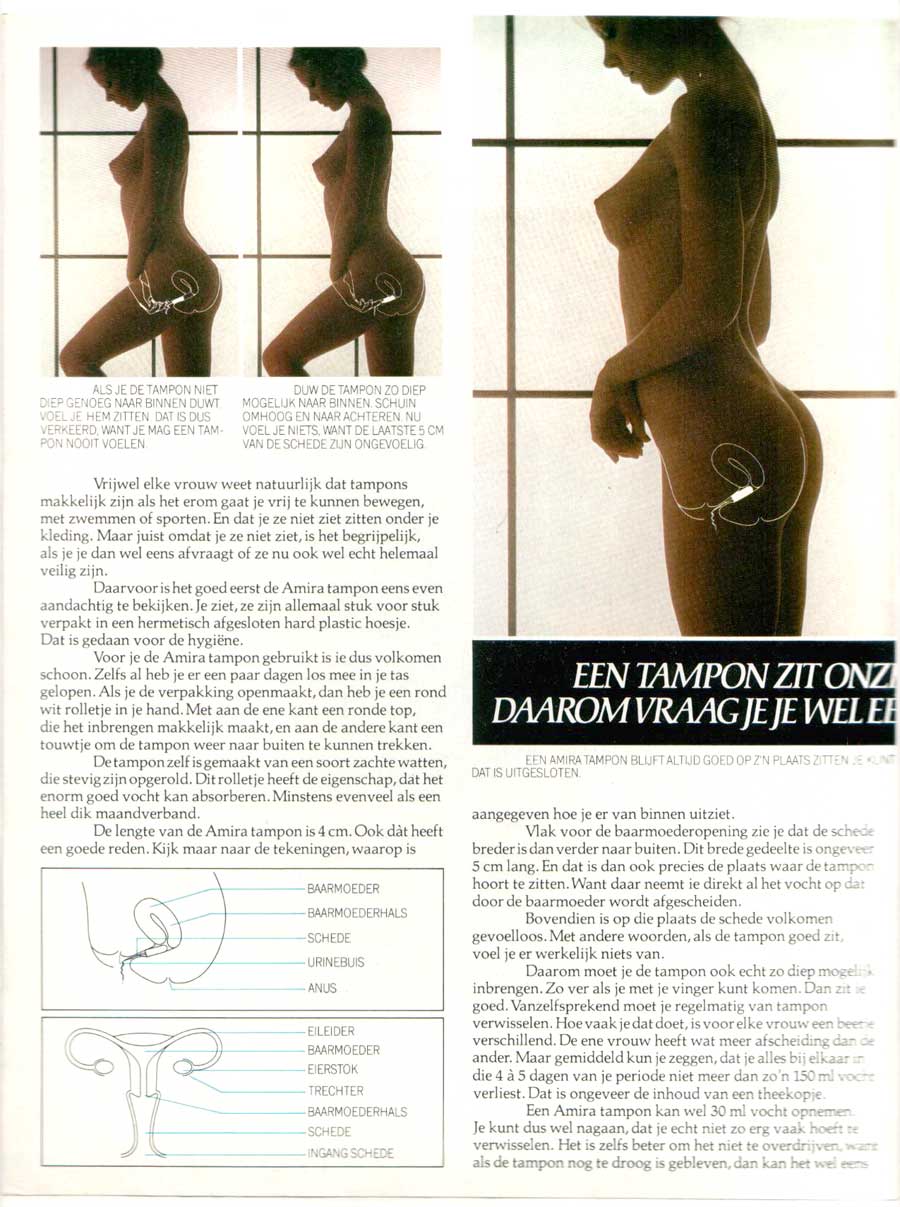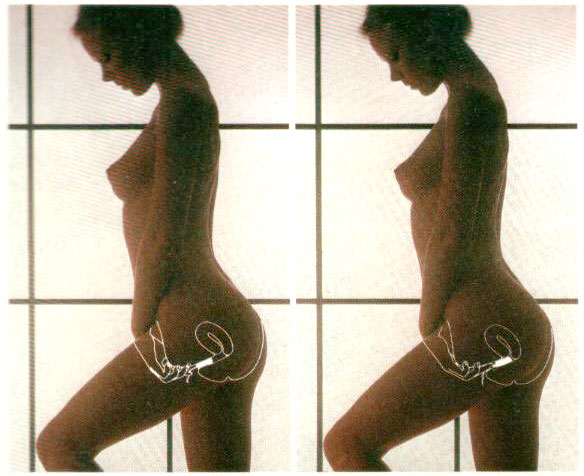Dutch
booklet for menarcheal girls -
Early Dutch
Tampax ads -
Early Dutch
booklet for
Camelia pads - Dutch exhibit about menstruation, 1982
(article) - Dutch Nefa menstrual pad ads,
1938, 1967 - early brochure for the German Amira
(1950s)
German and French menstrual ads using
nudity.


|

The Museum of Menstruation and
Women's Health
Ad for Amira
menstrual tampon (the
Netherlands, August 1979 in the
magazine "Mensen" [People])
Blue
liquid (next
page)
Imagine an
American company showing this ad
in an American magazine. You can't,
can you!?
The
Dutchman who contributed the
scans of this ad wrote,
Nice to
see your recent updates and
especial your mentioning the
difference between the U.S.
and Europe in advertising.
Your Polivia ad but also the
Swedish and Finnish ads reminds
me of a series of single and
double-page ads of Amira
tampons [in the
Netherlands.]. [See also German and French menstrual ads
using nudity.]
The
brand was of the well-known
company Mølnlycke but is
nowadays non-existent in my
country.
The name Amira means princess, see e.g.
http://www.thinkbabynames.com/meaning/0/Amira:
"The girl's name Amira
\a-mi-ra\ is pronounced
ah-MEER-ah. It is of Arabic
and Hebrew origin, and its
meaning is "princess; treetop,
proverb, or sheaf of corn.
Feminine form of Amir." In the
seventies in the Netherlands I
had never heard of this name
(except as the brand-name) but
nowadays sometimes you read
the name when a girl or a
horse is called Amira. [Maybe
even more so because of the
large Muslim population of the
Netherlands.]
The
double-page ad I send you
[below] shows a nude woman
from the side. The ad shows
the reader how to position the
tampon, including her finger
position. So in this ad the
position of the woman is more
to the point than in the
Polivia ad, I think.
The ad
is one of a series of three
but they have all the same
layout, the same sort of
photos and the same sort of
copy as the one I'm sending
you.
This
particular ad appeared August
1979 in magazine "Mensen"
[People]. The magazine was not
exactly a women's magazine as
[the American] Cosmopolitan
but more psychology-oriented.
But other ads of the series
were publicized in the Dutch
weekly women magazines Libelle
and Margriet.
The
title: A tampon sits invisible
within you. That's why you ask
yourself: will it do no harm?
The body
(no pun intended) text is
quite large: in the seventies
many Dutch women had to be
assured or to be reassured
that tampons are normal,
healthy, etc. [just as in this
German
ad
from 1989]. The same companies
had just made their sanitary
napkins more comfortable, etc.
(beltless, and the
first ultra thins came on
market), so the competition
between napkins and tampons
was on.
Toxic
shock syndrome was no issue in
1979 (only P&G was aware
internally that problems were
ahead I think at that moment),
but the fear of foreign
objects in a woman's body is,
I think, a constant problem.
[Actually, a supermarket
tabloid wrote about
other serious problems with
Rely in 1975-76, way before
the toxic shock outbreak.]
So the
ad mentions it but says it is
complete healthy, see e.g. the
first column, page 2, second
half: little pieces are no
problem, they go with the flow
out of you; the chance of
irritation is lower than with
napkins. That is exactly the
same argument as in the Tampax
report of 1945!!
But the
test on the
right-hand page is the same as
in many other ads of that time
or nowadays: the blue liquid
did not resemble red blood!
I thank
again the kind Dutchman who
sent these scans as well as
many other items!
|
Below:
The entire ad runs across two
pages; the enlarged
left-hand side is below this
image. The enlarged
right-hand page is here.
Large words: "A tampon sits
invisible within you. That's why
you ask yourself: will it do no
harm?"
|
 |
 |
Below:
The two photos at top, enlarged.
|
 |
NEXT: Facing page of
the ad - Early brochure for the German
Amira (1950s) - Dutch booklet for menarcheal
girls - Early Dutch Tampax ads - Early Dutch booklet for Camelia
pads - Dutch exhibit about
menstruation, 1982 (article) -
Dutch Nefa menstrual pad ads, 1938, 1967 - The tampon page - German and French menstrual ads
using nudity.
© 2008 Harry Finley. It is
illegal to reproduce or distribute
any of the work on
this Web site in any manner or
medium without written permission
of the
author. Please report suspected
violations to hfinley@mum.org
|
|